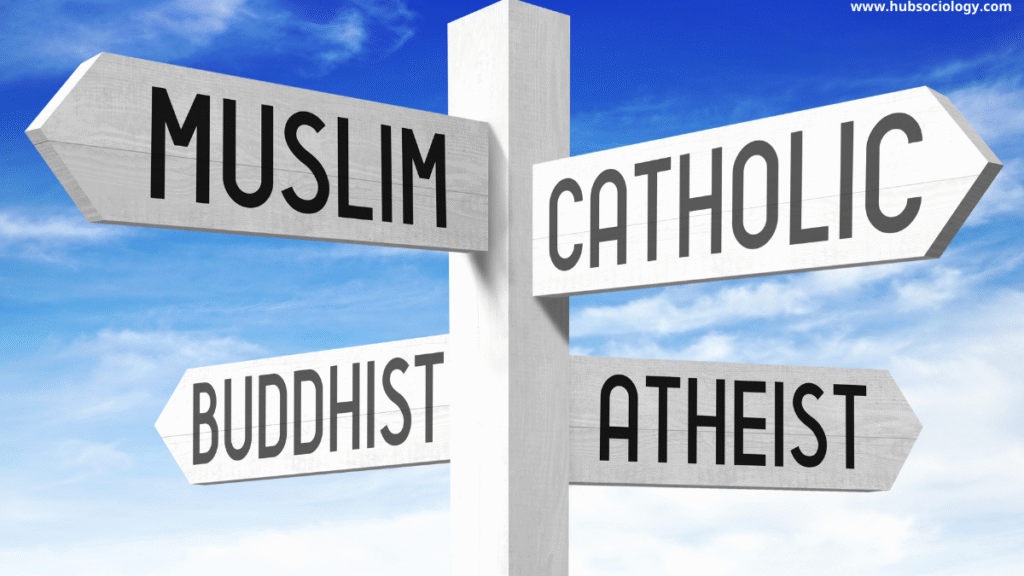Introduction
Religious conversion is one of the most fascinating and contested phenomena within the study of religion and society. It refers to the process of changing one’s religious affiliation, belief system, or spiritual orientation from one tradition to another. Sociologically, it is not merely a personal or spiritual experience but also a social act, shaped by cultural norms, group dynamics, political forces, and historical conditions. Conversion has implications for identity, community, and power relations. By examining religious conversion through a sociological lens, one can better understand how religion interacts with society, how social structures influence belief systems, and how personal faith journeys often reflect larger social processes.

Meaning of Religious Conversion
Religious conversion can be understood as the shift from one religious worldview to another. It may involve a complete renunciation of the old religion and acceptance of a new one, or a modification of spiritual practices within the same tradition. Sociologists see conversion as a form of social transformation, because it often alters an individual’s identity, roles, and social networks. Conversion may be voluntary, based on conviction and personal choice, or involuntary, influenced by coercion, social pressure, or political authority.
Max Weber, Emile Durkheim, and other classical sociologists have emphasized that religion is not only a matter of faith but also an institution embedded in social life. Thus, conversion is not only a theological matter but also a shift in social belonging and collective consciousness.
Types of Religious Conversion
Sociologists identify various types of religious conversion based on process, motivation, and context:
- Intellectual Conversion – When individuals adopt a new religion due to rational conviction, philosophical reasoning, or dissatisfaction with old beliefs.
- Mystical Conversion – Occurs through personal spiritual experiences, visions, or encounters perceived as divine.
- Experimental Conversion – Individuals try new religious practices, rituals, or communities before committing fully.
- Revivalist Conversion – Associated with mass religious movements, revival meetings, or charismatic leaders who inspire collective conversion.
- Coercive Conversion – When individuals are compelled to change religion due to force, law, or political power.
- Social Conversion – Occurs due to marriage, migration, or integration into a new social group where religious conformity is expected.
These types demonstrate that conversion is not a uniform act but a multifaceted process influenced by both internal convictions and external social conditions.
Sociological Theories on Religious Conversion
1. Durkheim’s Functionalist View
Durkheim emphasized religion as a source of social cohesion. Conversion, from this perspective, can be seen as an effort to re-establish belonging in a new collective. For example, individuals joining new faith communities often find solidarity, moral guidance, and collective identity.
2. Weber’s Perspective
Max Weber analyzed conversion in relation to religious authority and rationalization. He highlighted how charismatic leaders, like prophets, often inspire mass conversions by offering a new ethical order. Conversion, then, becomes a mechanism of social change and reorientation of values.
3. Symbolic Interactionism
From this perspective, conversion is about redefining self-identity through interaction with others. The individual negotiates meaning with the new religious group, adopting new symbols, rituals, and language that reshape personal identity.
4. Conflict Theory
Marxist sociological perspectives emphasize the role of power and class in religious conversion. Conversion can be used as a tool for political control, colonial domination, or resistance. For example, many conversions during colonial periods were influenced by missionary activity tied to imperial power.

Factors Influencing Religious Conversion
- Social and Cultural Factors
- Peer influence, family, and community can shape decisions to convert.
- Migration and globalization expose individuals to new religions, increasing the likelihood of conversion.
- Psychological Factors
- A personal crisis, trauma, or existential quest often makes individuals more receptive to conversion.
- The search for meaning and identity may drive people toward new faith systems.
- Economic and Political Factors
- In some contexts, conversion offers access to resources, protection, or social mobility.
- Political authorities may promote or discourage conversions depending on state-religion relations.
- Missionary and Evangelical Activities
- Organized efforts by religious groups, such as proselytizing and missionary work, significantly contribute to conversion trends.
- Marriage and Social Integration
- Interfaith marriages often result in conversion for social harmony.
- Immigrant communities may convert to integrate into host societies.
Religious Conversion and Identity
Conversion has a profound impact on identity. Religion is often central to self-definition, shaping values, worldviews, and lifestyles. When individuals convert, they undergo a re-socialization process, adopting new norms and shedding old ones. This can create identity conflicts, particularly if the former religious community views conversion as betrayal.
At the same time, conversion can empower individuals by offering them a sense of purpose, belonging, and liberation. For marginalized groups, conversion has historically been a tool for social protest and emancipation. For instance, in India, the mass conversion of Dalits to Buddhism under B. R. Ambedkar was both a spiritual and social act, aimed at escaping caste oppression.
Religious Conversion in Historical and Contemporary Contexts
Throughout history, religious conversion has played a pivotal role in shaping civilizations.
- In Ancient Empires: Conquerors often imposed their religions on subjugated populations, making conversion a political tool.
- During Colonialism: Christian missionary activities led to widespread conversions in Africa, Asia, and Latin America. This was intertwined with colonial domination but also offered new cultural resources to local populations.
- Modern Times: Conversion has become more individualized, often linked to globalization, interfaith dialogue, and the rise of new religious movements.
In contemporary societies, conversion is debated in the context of religious freedom, secularism, and minority rights. Some nations see conversion as a threat to cultural identity and impose legal restrictions, while others uphold it as a basic human right.
Social Consequences of Religious Conversion
- Integration or Alienation – Converts may find new belonging in their adopted religion but also face alienation from their previous community.
- Conflict and Tension – Conversions can spark inter-religious tensions, particularly in pluralistic societies.
- Cultural Transformation – Conversion contributes to cultural hybridity, enriching traditions through exchange of rituals and ideas.
- Empowerment – For marginalized individuals, conversion may open avenues for dignity, education, and equality.
Challenges and Controversies
Religious conversion is often controversial due to its implications for social cohesion and power relations. Major challenges include:
- Accusations of Forced Conversion – Critics argue that some conversions are motivated by economic incentives or coercion rather than genuine faith.
- State Restrictions – Some governments regulate or restrict conversions to preserve national or religious identity.
- Social Backlash – Converts may face discrimination, violence, or exclusion from their communities.
- Authenticity Debate – Religious authorities sometimes question whether conversions are genuine or opportunistic.
Conclusion
Religious conversion, when viewed sociologically, is not just about adopting a new faith but about navigating complex intersections of identity, power, and society. It reflects both individual quests for meaning and larger social dynamics such as migration, colonialism, modernization, and globalization. While conversion can empower individuals and communities, it also generates conflict, resistance, and debate.

In a pluralistic world, understanding religious conversion requires balancing respect for individual freedom with sensitivity to cultural diversity and social harmony. For sociologists, it remains a vital subject for exploring how religion continues to shape, and be shaped by, the broader fabric of human society.
Do you like this this Article ? You Can follow as on :-
Facebook – https://www.facebook.com/hubsociology
Whatsapp Channel – https://whatsapp.com/channel/0029Vb6D8vGKWEKpJpu5QP0O
Gmail – hubsociology@gmail.com
Topic-related questions
5 Marks Questions
- Define religious conversion from a sociological perspective.
- Mention any four types of religious conversion.
- Explain the role of marriage in religious conversion.
- How does symbolic interactionism explain religious conversion?
- State two social consequences of religious conversion.
10 Marks Questions
- Discuss the major factors influencing religious conversion in society.
- Explain the different sociological theories (Durkheim, Weber, Conflict, Symbolic Interactionism) of religious conversion.
- Examine the role of missionaries and evangelism in promoting religious conversion.
- How does religious conversion impact individual and group identity?
- Discuss the challenges and controversies related to religious conversion in modern societies.
15 Marks Questions
- “Religious conversion is not merely a spiritual act but also a social transformation.” Discuss with examples.
- Analyze the historical and contemporary contexts of religious conversion and its implications for society.
- Evaluate the positive and negative consequences of religious conversion in a pluralistic society.
- Discuss the role of religious conversion in social mobility and empowerment of marginalized communities with reference to examples.
- Critically examine the relationship between religious conversion, state authority, and social conflict.
